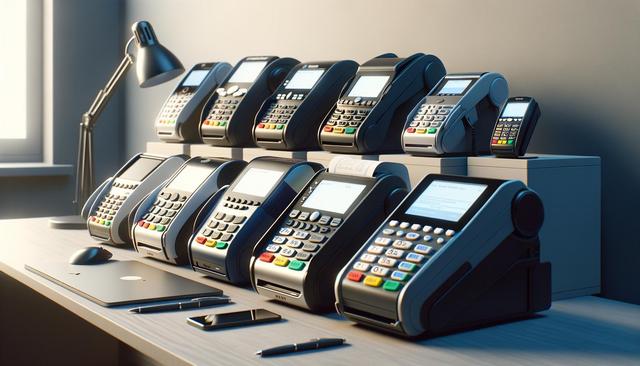Choosing Credit Card Machines That Work for Your Business
Finding the right credit card machine can make a significant difference in how smoothly your business operates.

Understanding Your Business Needs
Before selecting a credit card machine, it’s essential to evaluate your specific business requirements. The type of business you operate—whether it’s retail, service-based, or mobile—will influence your choice of equipment. For example, a food truck or pop-up vendor may benefit from Mobile Credit Card Processing options, while a brick-and-mortar store might prioritize countertop systems that integrate with existing point-of-sale software. Understanding where and how you process payments helps narrow down the most suitable options for your operations.
It’s also important to consider the volume and frequency of your transactions. Businesses with high transaction volumes may need machines that process payments quickly and efficiently to avoid long customer wait times. On the other hand, smaller businesses or startups may benefit more from flexible, low-cost solutions. Carefully assessing these needs ensures you’re not overpaying for features you don’t use or missing out on functionality that could streamline your workflow.
Evaluating Different Types of Credit Card Machines
There are several types of credit card machines available, each offering unique advantages depending on your business environment. Common options include:
- Countertop terminals: Ideal for retail stores with a dedicated checkout area.
- Wireless Credit Card Terminals: Useful for restaurants or outdoor events where mobility is needed.
- Mobile card readers: Allow you to Accept credit Card Payments on Phone, making them ideal for service providers and on-the-go businesses.
Each option varies in terms of mobility, cost, and connectivity. Wireless and mobile solutions often use Wi-Fi or cellular data, while countertop models typically rely on a direct internet or phone line connection. When evaluating machines, consider whether the device supports contactless payments, EMV chip cards, and magnetic stripe transactions to ensure compatibility with customer preferences.
Comparing Credit Card Processing Vendors
Choosing among Credit Card Processing Vendors can significantly affect your transaction fees, service quality, and overall satisfaction. It’s important to compare vendors based on several factors:
- Transaction fees: Look for transparent pricing structures to avoid hidden charges.
- Customer support: Reliable support can make a difference during technical issues or disputes.
- Contract terms: Some vendors require long-term commitments, while others offer more flexible arrangements.
Additionally, consider whether the vendor provides the hardware or if you need to purchase it separately. Some vendors bundle machines with their processing services, which can be cost-effective. Others may allow you to use third-party machines, offering more flexibility but requiring additional setup.
Balancing Cost and Functionality
Finding the Cheapest Credit Card Processing option doesn’t always mean sacrificing quality. Many solutions offer a balance between affordability and useful features. When assessing cost, look beyond the initial price of the machine and consider ongoing expenses such as monthly service fees, transaction rates, and maintenance costs.
Small and medium-sized businesses can often find competitively priced options that still deliver essential capabilities. For example, mobile readers that let you Accept credit Card Payments on Phone are not only affordable but also offer seamless integration with invoicing or inventory apps. Businesses should weigh the costs against the benefits each machine brings to everyday operations, especially if it contributes to faster checkouts or improved customer satisfaction.
It’s also worth exploring options with no monthly minimums or cancellation fees. This reduces financial risk, especially for businesses with fluctuating sales volumes. Some vendors also offer trial periods, giving you the opportunity to test the device before making a long-term commitment.
Implementation and Ongoing Support
Once you’ve chosen a machine, the next step is implementation. This process includes setting up the machine, integrating it with your sales system, and training your staff. Many vendors provide onboarding assistance, which can help ensure a smooth transition. Make sure the device is user-friendly and that your team feels confident operating it.
Ongoing support is another critical factor. Whether you choose a Wireless Credit Card Terminal or mobile reader, having access to prompt technical assistance can prevent disruptions during peak business hours. Look for vendors offering 24/7 support and a reliable service history.
To keep your system running efficiently, perform regular updates and maintenance. This helps ensure compatibility with new payment technologies and security standards. A well-maintained credit card machine not only supports smoother operations but also enhances customer trust in your business.
Conclusion: Making the Right Choice for Your Business
Choosing credit card machines that work for your business involves more than just comparing prices. It requires a thoughtful assessment of your operational needs, transaction volume, and customer preferences. Whether you opt for Mobile Credit Card Processing or a Wireless Credit Card Terminal, the right equipment can enhance your service delivery and streamline payment handling.
Take the time to research Credit Card Processing Vendors, compare contract terms, and consider long-term costs. By doing so, you’ll find a solution that not only fits your budget but also supports your business growth effectively. The ideal setup combines affordability, functionality, and dependable support, making daily operations smoother and more efficient.